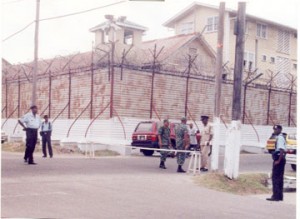It was reported in the Sunday Stabroek of October 5 that a murder suspect was to receive $75 a day for ‘inhumane’ jail conditions. If we could have such a judgment in our courts it would perhaps move the authorities to make conditions in the lock-ups more humane.
Some years ago the Guyana Consumers Association arranged for a team to visit the lock-ups to view the conditions. It was noticeable that there was a great deal of activity in the morning before our visit. The corridors were wet and the smell of disinfectant was high.
These cells at the lock-ups house six or seven men who are locked in from 18 hours to 6 hours next morning. They are not allowed exit to toilets and use a hole in the floor for relieving themselves. Naturally the scent is unbearable but has to be endured night after night. It is a horrifying experience that may haunt persons for years to come on sleepless nights.

You may ask: Have the authorities not considered that small buckets with covers could be used by each person and a commode placed for the convenience of those who need it during the night. This, 1 understand is impossible as the buckets would be used to cause injury during a quarrel.
It is also well known that meals are not provided. So if the family fails to send a meal the person may go hungry for the day or receive a makeshift meal. Why can the authorities not provide meals?
There are no beds provided and the men sleep on the floor on shirts or newspapers or even standing. One can think of the damp, the stench and the heat in these hot days and nights. It is not something to be proud of but the only improvement may be the reduction of the numbers in the lock-ups These are persons on remand who have not been found guilty of any crime and some of the crimes may be petty such as motor vehicles offences.
It is understood that conditions in the prisons are better as beds are available. Peter Ramsaroop in his book “HOPE FOR OUR NATION” describes conditions in the prisons and the many years before trials are held. He also makes recommendations for improvement.
There is a new aspect to jail conditions. A letter in the Stabroek News of 15 October carries this headline “This phenomenon of prisoners dying while under protection of the state is wholly unacceptable“. To date there have been three instances and if allowed to continue without public protest it may grow.
There were times when Mrs Dennis Irvine visited the prisons on a regular basis to counsel and no doubt have the inmates recount any unsatisfactory conditions. Since her departure from Guyana has anyone else been appointed to visit the prisons?
Some years ago there was a programme on BBC ` Behind Bars’.. I happened to tune in to it and was greatly impressed to learn that the Director of a Prison in India had written a book on the prison service. She viewed the prison as a Place of Correction not punishment and ran it on the lines of an educational institution teaching different subjects during the day.
What is needed is a sociological survey to discover the cause of crime. Are children really born with a desire to be anti-social or is it acquired? If they are born anti-social is it due to some distress that the mothers suffered during pregnancy?
Do let us be civilized and not stick to ancient methods because we are too lazy to make a change.





